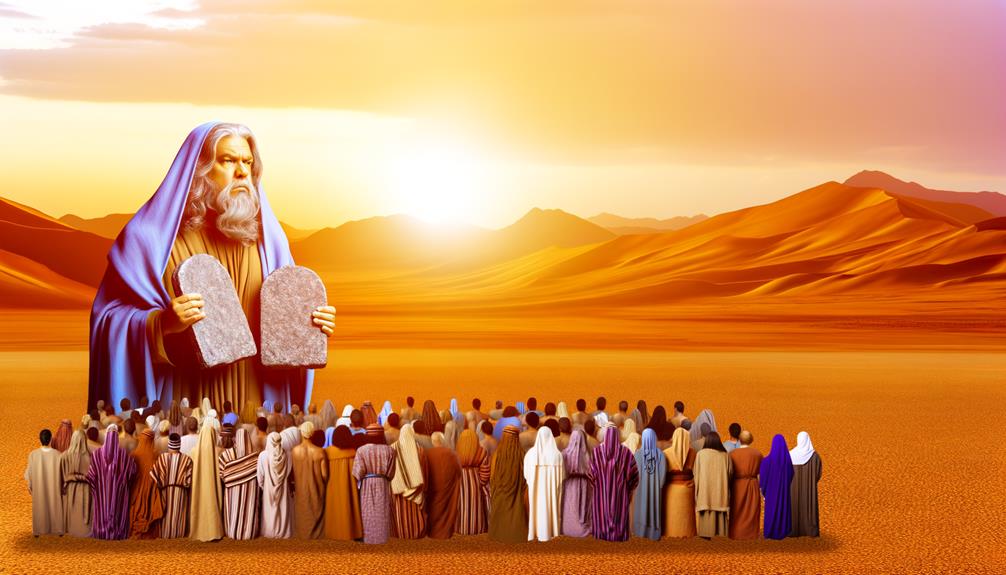Meaning of Bible Book Names: Origins and Symbolism
The names of the books of the Bible encapsulate their core themes and theological messages. ‘Genesis‘ signifies ‘beginnings,’ narrating the origins of the universe and humanity.
‘Exodus‘ denotes ‘departure,’ recounting the Israelites’ escape from Egyptian bondage. ‘Leviticus‘ focuses on ‘priestly law’ and rituals.
‘Numbers’ represents the ‘wilderness journey,’ documenting the Israelites’ trials and censuses. ‘Deuteronomy’ means ‘second law,’ reiterating Moses’ teachings.
In prophetic literature, ‘Isaiah‘ translates to ‘Salvation of Yahweh,’ while ‘Jeremiah’ is known as the ‘Weeping Prophet.’ The New scripture book ‘Matthew’ means ‘Gift of Yahweh,’ and ‘Revelation‘ translates to ‘Unveiling.’ Explore further to understand these names more deeply.

Meaning of Bible Book Names: Origins and Significance
| Book Name | Meaning | Significance |
|---|---|---|
| Genesis | Beginning or Origin | Describes the creation of the world and humanity. |
| Exodus | Departure | Represents the deliverance of Israelites from Egypt. |
| Psalms | Songs or Praises | A collection of songs and prayers to God. |
| Proverbs | Wise Sayings | Offers guidance and wisdom for daily living. |
| Revelation | Unveiling or Disclosure | Details visions of the end times and Christ’s return. |
Genesis: Beginnings

Genesis, frequently regarded as the foundational book of the Bible, encapsulates the origins of the universe, humanity, and the early narratives that shape Judeo-Christian theology.
Derived from the Greek word ‘genesis,’ meaning ‘origin’ or ‘beginning,’ the text serves as a prologue to the entire biblical canon.
It systematically presents the creation of the world, the fall of man, and the genealogies leading to the patriarchs such as Abraham, Isaac, and Jacob.
These stories are not mere historical accounts but are imbued with theological significance, elucidating themes of divine sovereignty, human responsibility, and covenantal relationships.
Exodus: Departure

Exodus, the second book of the Bible, chronicles the pivotal departure of the Israelites from Egyptian bondage, marking a significant change in their journey towards nationhood and covenantal identity. This exodus, under Moses’ leadership, is not merely a physical relocation but a transformative event that involves divine intervention and the establishment of a unique relationship between God and His people.
| Event | Significance |
|---|---|
| Plagues of Egypt | Demonstrates God’s power over Pharaoh |
| Passover | Symbolizes liberation and divine favor |
| Crossing the Red Sea | Represents miraculous deliverance |
| Sinai Covenant | Formalizes the Israelites’ obligations |
| Tabernacle Instructions | Establishes worship and community order |
These foundational events define the theological and cultural identity of the Israelite nation.
Leviticus: Priestly Law

Building upon the foundational narrative of Israel’s liberation, Leviticus focuses on the intricate laws and rituals that define the Israelite priesthood and their approach to holiness. This book is pivotal in outlining the religious and ethical framework essential for the community’s covenantal relationship with God. Essential themes include purity, sacrificial rites, and moral conduct. Leviticus is systematically structured to guide the priestly class and the laity alike.
Key components include:
- Sacrificial Offerings: Detailed instructions for various sacrifices, including burnt, grain, and sin offerings.
- Priestly Ordination: Rules governing the consecration and responsibilities of priests.
- Purity Laws: Regulations on cleanliness, dietary restrictions, and health-related practices.
- Holiness Code: Ethical and moral guidelines essential for maintaining communal sanctity.
Each of these elements underscores the meticulous nature of maintaining divine proximity.
Numbers: Wilderness Journey

The Book of Numbers, central to the wilderness narrative, meticulously documents the Israelites’ census and organizational structure, providing a framework for their journey.
This period is marked by a complex interplay of faith and rebellion, reflecting the community’s struggle to adhere to divine mandates while grappling with human frailties.
Analyzing these themes offers profound insights into the dynamics of leadership, trust, and disobedience within a nascent nation.
Census and Organization
In the context of the Israelites’ wilderness journey, the Book of Numbers meticulously documents the census and organizational structure essential for managing the nascent nation. This foundational text underscores the importance of order and preparation in shifting from slavery to nationhood.
The census serves multiple critical functions:
- Military Organization: It identifies able-bodied men for defense and conquest.
- Tribal Inheritance: It guarantees equitable distribution of land among tribes.
- Service Allocation: It designates Levites for specific religious duties.
- Community Structure: It maintains social order by recognizing family and tribal affiliations.
Such meticulous documentation highlights the necessity for structured governance and resource allocation, crucial for the survival and cohesion of the Israelite community during their formative wilderness period.
Faith and Rebellion
Amidst the Israelites’ arduous journey through the wilderness, the Book of Numbers intricately portrays the oscillation between steadfast faith and recurrent rebellion, revealing the profound complexities of their relationship with divine guidance. The narrative captures moments of devout trust, such as the Israelites’ reliance on manna, juxtaposed against episodes of defiance, exemplified by the rebellion of Korah. This duality underscores the fragile human disposition towards divine authority.
| Episode | Faith | Rebellion |
|---|---|---|
| Manna Provision | Trust in divine sustenance | Complaints about hardship |
| Spies in Canaan | Minority’s faith in God’s plan | Majority’s fear and dissent |
| Korah’s Rebellion | Aaron’s priestly legitimacy | Challenge to divine order |
This complex interplay of faith and rebellion illuminates the broader theological themes within Numbers.
Deuteronomy: Second Law

Why is Deuteronomy often referred to as the ‘Second Law,’ and what implications does this title have for understanding its place within the Pentateuch?
Deuteronomy, derived from the Greek ‘deuteros’ (second) and ‘nomos’ (law), serves as a reiteration and expansion of the laws presented in Exodus, Leviticus, and Numbers. This title emphasizes its role in:
- Reaffirming the covenant: It restates the laws given at Sinai, ensuring continuity.
- Moses’ final address: It represents Moses’ final instructions, underscoring their importance.
- Preparation for the Promised Land: It prepares Israel for life in Canaan, adapting laws to new contexts.
- Theological reflection: It deepens theological themes, such as monotheism and covenant fidelity.
These elements underscore Deuteronomy’s critical role in shaping Israel’s religious and social identity.
Psalms: Songs and Prayers

The Book of Psalms serves as a rich tapestry of ancient worship practices, encapsulating hymns, prayers, and liturgical elements pivotal to Israelite spiritual life.
It uniquely combines poetic artistry with profound emotional expressions, ranging from lamentation to exuberant praise, thereby offering a thorough spectrum of human sentiment in relation to the divine.
This dual function as both song and prayer underscores its integral role in both personal devotion and communal worship throughout biblical history.
Ancient Worship Practices
In ancient Israelite culture, the Book of Psalms served as a central compilation of songs and prayers that played a pivotal role in communal and individual worship practices. This sacred text was utilized in various religious settings and held profound significance in the spiritual lives of the people.
Key aspects of its use included:
- Liturgical Functions: Psalms were integral to temple worship, often recited or sung during rituals and ceremonies.
- Personal Devotion: Individuals used Psalms for private meditation and prayer, offering a means to connect with the divine.
- Communal Identity: The shared recitation of Psalms fostered a sense of community and collective identity among the Israelites.
- Educational Tool: The Psalms served as a medium for teaching theological concepts and ethical guidelines.
Emotional Expressions in Psalms
Psalms, as both songs and prayers, encapsulate a wide spectrum of human emotions, reflecting the profound and multifaceted relationship between the Israelites and their deity. These compositions articulate joy, sorrow, gratitude, and lamentation, serving as a mirror to the human soul’s journey through life’s vicissitudes. The emotional depth in Psalms can be categorized as follows:
| Emotion | Representative Psalm |
|---|---|
| Joy | Psalm 100 |
| Sorrow | Psalm 6 |
| Gratitude | Psalm 30 |
| Lamentation | Psalm 22 |
| Trust | Psalm 23 |
This emotional richness allows Psalms to resonate deeply with readers, providing a timeless reflection on the human condition and the spiritual quest for connection and understanding. Their universal themes continue to offer solace and inspiration.
Proverbs: Wisdom Sayings

Proverbs, a cornerstone of biblical literature, encapsulates a collection of wisdom sayings that offer profound insights into ethical and moral living. This compendium, traditionally attributed to King Solomon, serves as a guide for righteous conduct and prudent decision-making.
The thematic elements of Proverbs revolve around the pursuit of wisdom, understanding, and knowledge, often contrasting the life of the wise with that of the foolish.
Key takeaways from Proverbs include:
- The Fear of the Lord: Reverence for God as the foundation of wisdom.
- The Value of Wisdom: Wisdom’s role in leading a prosperous and honorable life.
- Moral Integrity: Upholding honesty and justice.
- Prudent Speech: The importance of careful and thoughtful communication.
These principles underscore the book’s enduring relevance in contemporary ethical discourse.
Isaiah: Salvation of Yahweh

Isaiah, whose name signifies ‘Salvation of Yahweh,’ commences on a profound prophetic mission characterized by themes of divine justice, hope, and redemption.
His prophecies not only address the immediate circumstances of Judah and Israel but also extend to the eschatological expectations of a future, messianic salvation.
Through a complex interplay of judgment and hope, Isaiah’s messages underscore Yahweh’s ultimate plan for restoration and deliverance.
Isaiah’s Prophetic Mission
Isaiah’s prophetic mission, characterized by his unwavering commitment to proclaiming the message of divine salvation, underscores the theological significance of Yahweh’s redemptive plan for Israel. His ministry highlights critical aspects of God’s interaction with His people, particularly focusing on the promise of salvation amidst impending judgment.
Key elements of Isaiah’s mission include:
- Divine Call: Isaiah’s vision of Yahweh in the temple (Isaiah 6) marks his commissioning as a prophet.
- Message of Hope: Despite warnings of judgment, Isaiah emphasizes future restoration and salvation (Isaiah 40-66).
- Messianic Prophecies: Foretelling the coming of a savior, Isaiah speaks of a suffering servant (Isaiah 53).
- Covenantal Faithfulness: Isaiah reminds Israel of Yahweh’s unwavering commitment to the covenant, urging repentance and faith.
This all-encompassing mission highlights Isaiah’s pivotal role in biblical theology.
Themes of Divine Justice
In the broader narrative of Isaiah’s prophetic mission, the themes of divine justice emerge prominently, underscoring Yahweh’s righteousness and the moral imperatives for His people.
Isaiah articulates a vision where divine justice demands accountability, particularly addressing the social injustices and idolatry rampant in Judah.
The prophet portrays Yahweh as both judge and redeemer, emphasizing that His justice is inherently tied to His covenantal relationship with Israel.
This justice is not merely punitive but restorative, aiming to recalibrate the nation’s moral compass.
Through oracles and lamentations, Isaiah underscores that adherence to Yahweh’s laws is paramount, as divine justice serves both as a warning and a path to righteousness.
Consequently, Isaiah’s message is a clarion call for ethical integrity and spiritual fidelity.
Hope and Redemption
Central to the prophetic narrative is the theme of hope and redemption, which underscores the transformative power of Yahweh’s salvation.
The Book of Isaiah presents the idea that divine intervention brings deliverance and renewal to a wayward nation. This profound theological concept is explored through various dimensions:
- Messianic Prophecies: Foretelling the coming of a savior who will restore Israel.
- Restoration of Israel: Promises of returning the nation to its former glory.
- Universal Salvation: Extending Yahweh’s grace beyond Israel to all nations.
- New Creation: Symbolizing spiritual rejuvenation and the establishment of a new covenant.
Isaiah’s message consequently serves as a cornerstone for understanding the intricate balance between divine justice and mercy within the biblical narrative.
Jeremiah: Weeping Prophet

Known as the ‘Weeping Prophet,’ Jeremiah’s profound emotional expressions and lamentations reflect the deep personal and communal anguish of his time.
His writings, particularly the Book of Jeremiah, depict the tumultuous period leading up to and following the Babylonian exile.
Jeremiah’s prophecies reveal his deep empathy for his people and his unwavering commitment to conveying divine messages, despite widespread rejection and persecution.
The term ‘weeping’ encapsulates his sorrow over Judah’s persistent disobedience and the impending divine judgment.
Additionally, his poignant laments serve as a powerful narrative tool, emphasizing the gravity of Israel’s spiritual and moral decline.
Jeremiah’s legacy, therefore, is one of a deeply compassionate figure bearing the heavy burden of prophetic truth.
Matthew: Gift of Yahweh

The name ‘Matthew,’ derived from the Hebrew name ‘Mattityahu,’ translates to ‘Gift of Yahweh,’ signifying the profound theological importance attributed to this apostolic figure in early Christian tradition. The Gospel of Matthew, which holds a pivotal position in the New Covenant, underscores this significance through its thematic elements and narrative structure.
- Genealogy of Jesus: Establishes Jesus’ messianic lineage, linking Old Covenant prophecies to New Covenant fulfillment.
- Sermon on the Mount: Presents core teachings of Jesus, encapsulating Christian ethics.
- Parables: Utilizes storytelling to impart moral and spiritual lessons.
- Great Commission: Emphasizes the universality of Jesus’ message, urging discipleship and evangelism.
Matthew’s name embodies his role as a conduit of divine revelation and grace.
Revelation: Unveiling

Revelation, derived from the Greek word ‘apokalypsis,’ meaning ‘unveiling’ or ‘disclosure,’ encapsulates the eschatological visions and prophecies revealed to the Apostle John.
This final book of the New Scripture presents a series of symbolic and apocalyptic imagery that conveys profound theological insights.
Contextually, Revelation addresses the early Christian communities under Roman persecution, providing hope and encouragement through its portrayal of divine justice and ultimate triumph over evil.
The text is rich in symbolism, drawing heavily from Old Scripture prophecies, and presents a narrative of cosmic conflict and redemption.
Scholarly interpretations often explore its multi-layered meanings, emphasizing themes of perseverance, faith, and the fulfillment of God’s salvific plan.
Revelation remains a pivotal work for understanding Christian eschatology.
Conclusion
In examining the etymology of the Bible’s book names, one uncovers the narrative arc of faith, akin to a tapestry woven with threads of history, law, prophecy, and revelation. Each title reflects the unique context and purpose of its contents, guiding readers through the intricate relationship between divine guidance and human experience. Among these, the historical books of the Bible serve as a bridge, connecting early ancestral narratives with the establishment of a community rooted in covenant and promise. As we delve deeper into these names, we discover not just literary designations, but a profound exploration of belief and identity interlaced through generations.
For instance, ‘Exodus,’ meaning ‘Departure,’ symbolizes not just a physical journey but a profound spiritual odyssey.
This linguistic exploration reveals the depth and context within each title, enriching the understanding of the theological and historical significance embedded in these ancient texts.
Such analysis underscores the intricate relationship between nomenclature and biblical themes.






